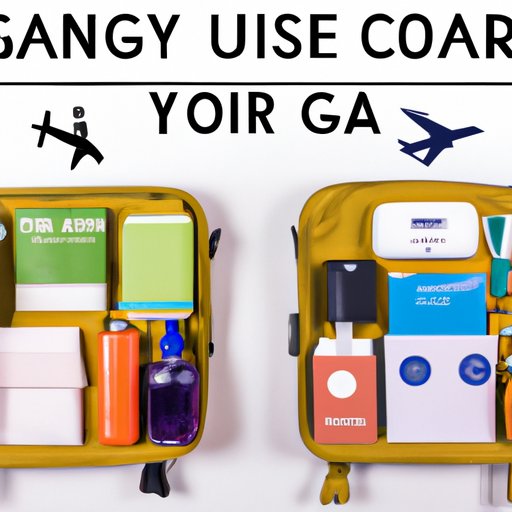
I. Introduction
When planning to travel by air, it’s important to know what items can and cannot be carried on a plane. This knowledge can help make the process smoother and prevent any stress or security issues when going through the TSA checkpoint. The purpose of this article is to provide a comprehensive guide for travelers on what to pack in their carry-on and what to leave behind.
II. Focus on Essentials
Travelers should always carry essential items, including passports, boarding passes, and wallets. Cell phones and chargers are also considered essential, so be sure to pack them in your carry-on. For those who take regular medications or wear eyeglasses, it’s important to pack them in a safe and accessible place.
We recommend packing these items in a separate bag that is easy to access in case you need to remove them in the TSA security line.
III. TSA Guidelines
The Transportation Security Administration (TSA) has a list of prohibited items that can’t be carried on a plane. This includes firearms, explosives, and other dangerous items. Travelers can visit the TSA website for a full list of prohibited items.
Liquids, gels, and aerosols are also subject to restrictions. These items must be in 3.4-ounce (100ml) containers or smaller and placed in a clear, plastic, quart-sized bag. Electronic devices such as laptops, tablets, and cameras must be easily accessible for screening and should be removed from their cases and placed in a separate bin.
We suggest arriving early at the airport, and to double-check the TSA guidelines before packing to avoid any issues in the security line.
IV. In-Flight Necessities
Maximizing your time on the plane often involves entertainment. Laptops, books, and headphones are great options to pass the time. Magazines and puzzles are also great in-flight distractions. For those who want to get some work done during the flight, we suggest packing their work items in their carry-on bags, like a laptop or tablet.
V. Eco-Friendly Carry-On
Travelers can take steps to reduce their impact on the environment while flying. Sustainable alternatives to single-use plastic items include reusable water bottles and utensils. These items can reduce waste that is often created during the in-flight meal service.
We encourage travelers to bring these items with them to reduce their carbon footprint while traveling.
VI. Personal Hygiene Products
Personal hygiene is important while traveling. Sanitary products for travelers, including wet wipes and tissues, should be included in the carry-on. Hand sanitizers and other disinfectants are also recommended, especially when traveling during flu season or pandemics.
Remember, keeping good hygiene practices in-flight can help prevent the spread of illnesses and keep travelers healthy.
VII. Conclusion
Knowing what to carry on a plane can help make travel safer and stress-free. Essential items like passports, boarding passes, and wallets should always be carried along. Travelers should also be aware of TSA guidelines on prohibited items and restrictions on liquids, gels, and aerosols.
Maximizing the in-flight experience and reducing environmental impact can be achieved through packing eco-friendly items, good-reads or in-flight entertainment options, and snacks. Finally, maintaining good hygiene practices throughout the flight can keep travelers healthy and free from any illnesses.
We hope this comprehensive guide helps travelers pack confidently and responsibly, and always encourages safe travel.




